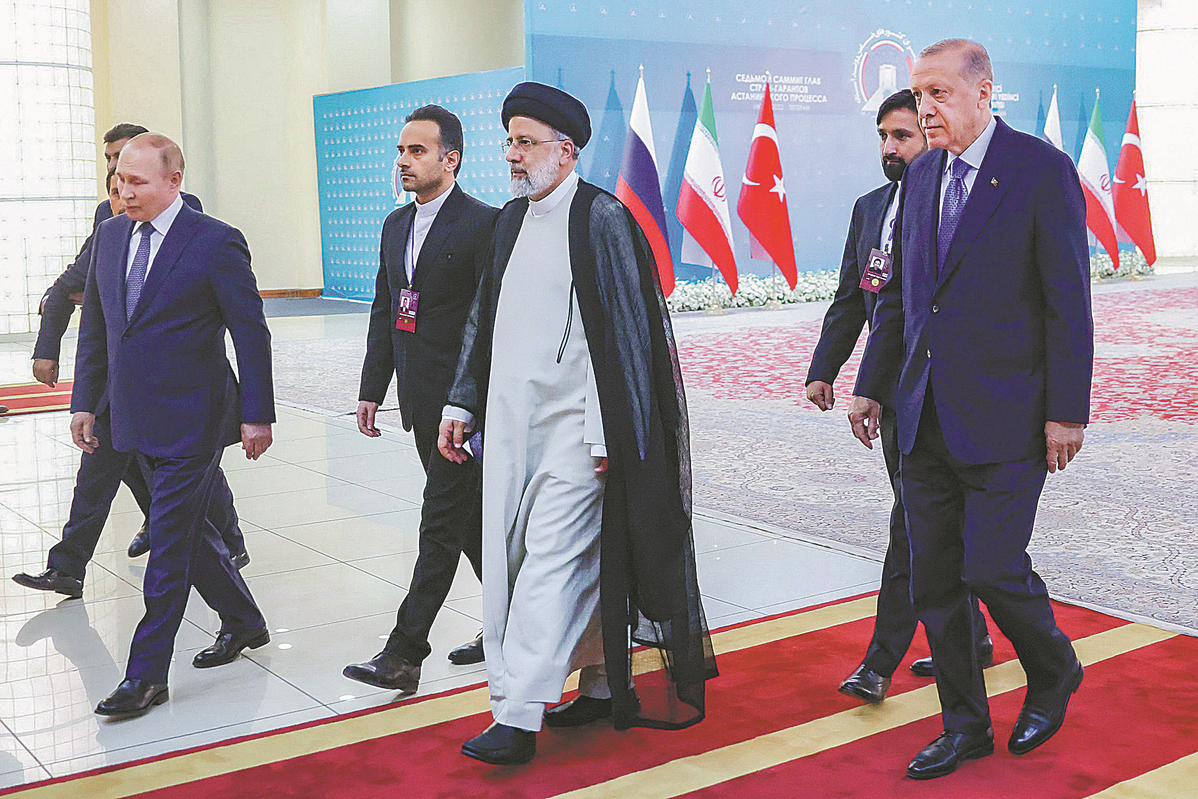Summit advances quest for Syria peace
By JAN YUMUL in Hong Kong | China Daily | Updated: 2022-07-21 09:50

Iranian, Turkish and Russian leaders show value of dialogue, analysts say
The coming together of Iranian, Turkish and Russian leaders for a summit that put Syria's peace-building process in focus shows that international affairs can be managed in a democratic and non-militaristic way, analysts and observers say.
They also said the trilateral meeting on Tuesday reaffirms that the Syrian crisis can be resolved without the United States' interference, with one expert saying its presence "has caused detriment to the region".
Iranian President Ebrahim Raisi, Russian President Vladimir Putin and Turkish President Recep Tayyip Erdogan met in Teheran for the seventh summit of nations engaged in the Astana peace talks on Syria. Their countries are guarantors to the Astana Process, which was initiated in 2017 for peace in Syria.
In a joint news conference on Tuesday evening, the three leaders praised the success of the dialogue and emphasized that all parts of Syria "should be established under the rule of a legitimate government".
The presence of US forces in territory east of the Euphrates River under any pretext, they said, "is not legitimate" and that they "should leave the area". US troops are still in Syria and have been accused on multiple occasions of stealing Syrian oil and even grain.
Raisi said the presidents agreed that attacks on the people and armed forces in Syria are "a violation of the sovereignty of this country and against international laws", and he stressed that such attacks must be stopped.
Putin said the future of Syria "must be drawn by the Syrians without dictating from outsiders", and Erdogan said they "do not see any difference between all terrorist organizations "and do not accept that "one is used as a tool to fight another".
Jawaid Iqbal, a political science professor and chairman of the Department of West Asian and North African Studies at Aligarh Muslim University in India, told China Daily that the summit is significant as it emphasized issues related to occupation, territorial integrity, terrorism, Western sanctions and national reconstruction.
Iqbal said that unlike the unilateral approach pursued by what the scholar termed the Euro-Atlantic world, the trilateral meeting's espousal of the Astana Process shows a multilateral method of resolving regional problems.
'Pragmatic recognition'
"Through a pragmatic recognition of the centrality of regional geopolitical stability, the Astana Process has proven to be accommodative, evident from the way in which Moscow and Teheran have been able to limit Ankara's plan to launch a military incursion into Syria's northern border region," said Iqbal.
Arhama Siddiqa, a Middle East expert and research fellow at the Institute of Strategic Studies Islamabad, said the statements made by the leaders reflected their individual positions on Syria. "For instance, President Raisi stated that both the American and Israeli presence was unacceptable. Likewise, Russia also condemned the West for the devastation in Syria," said Siddiqa.
"Peace in Syria should come about through a political process premised on inclusivity and that there is no military solution. The three countries also highlighted how the Astana Process has been successful and it is just the beginning of the reaffirmation that the Syrian crisis can be resolved without the US-the presence of the latter has only caused detriment to the region."
She said the principles behind the Astana Process stand in stark contrast with what US President Joe Biden sought to do on his trip to the Middle East this month, with his efforts "to reassure the region that the US had not deprioritized it". The trilateral meeting was important in that it means the world has not forgotten Syria, Siddiqa said.
Biden's visit to the region-his first since taking office last year-included his participation in the Jeddah Security and Development summit hosted by Saudi Arabia on July 16.
Biden said on the trip that the US would not "walk away and leave a vacuum" in the region for Russia, China, or Iran to fill, and that he would build on "American leadership". He also signed the Jerusalem Declaration with Israel, affirming the two nations' commitment to preventing the nuclear armament of Iran.
However, after a Gulf Cooperation Council summit attended by Biden, Saudi Arabia's Foreign Minister Prince Faisal bin Farhan Al Saud said there was no such thing as an "Arabic NATO" and that talks between Saudi Arabia and Iran "have been positive".He also confirmed that "Saudi Arabia's hand is extended to Iran to achieve normal relations".
Henelito A. Sevilla Jr, a Middle East expert and dean at the Asian Center at the University of the Philippines, said the summit in Teheran, and others like it, can contribute to the search for solutions among the parties in order for differences to be narrowed so that they can "work genuinely for the future peace and development of the Syrian people".
























